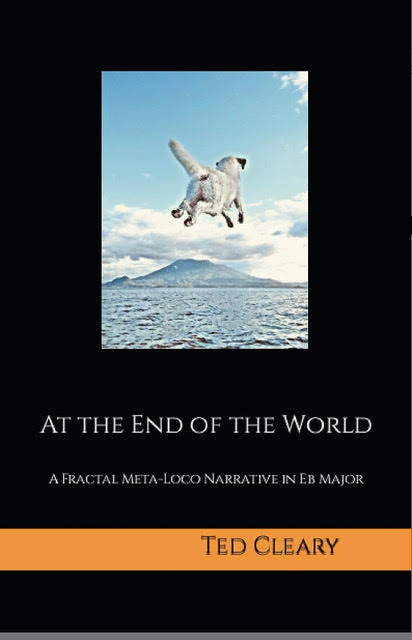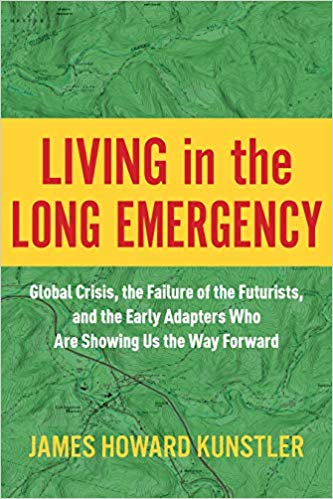The peak oil story has not been nullified by the scramble to
unload every asset for cash — including whomping gobs of oil contracts
— during this desperate season of bank liquidation. The main
implication of the peak oil story is that we won’t be able to generate
the kind of economic growth that defined our way of life for decades
because the primary energy resources needed for it will be contracting.
Just as global oil production peaked, our economy evolved into a
morbid hypertrophy, and the chief manifestation of it was the suburban
sprawl-building fiesta that has now climaxed in the real estate bust.
By the early 21st century, when so much American manufacturing had been
swapped out to Asia, there was no business left except sprawl-building
— a manifold tragedy which wrecked the banks that financed it, and
left the ordinary people mortgaged to it with ruinous liabilities.
That economy is now in its death throes. The “normality” it
represents to so many Americans is gone and can’t be brought back, no
matter how wistfully we watch it recede. Even so, it was obviously not
good for the country. The terrain of North America has been left
scarred by unlovable objects and baleful futureless vistas that, from
now on, will shed whatever pecuniary value they once had. It represents
the physical counterpart to the financial mess that has been left to
the young generations to clean up — and the job will take a very long
time.
We have to, so to speak, get to place mentally where we can face
the kinds of change that are now necessary and unavoidable. We’re not
there yet. It’s not clear whether the elected new national leadership
knows just how severe the required changes will really be. Surely the
public would be shocked to grasp what’s in store. Probably the worst
thing we can do now would be to mount a campaign to stay where we are,
lost in raptures of happy motoring and blue-light-special shopping.
The economy we’re evolving into will be un-global, necessarily
local and regional, and austere. It won’t support even our current
population. This being the case, the political fallout is also liable
to be severe. For one thing, we’ll have to put aside our sentimental
fantasies about immigration. This is almost impossible to imagine,
since that narrative is especially potent among the Democratic Party
members who are coming in to run things. A tough immigration policy is
exactly the kind of difficult change we have to face. This is no longer
the 19th century. The narrative has to change.
The new narrative has to be about a managed contraction — and by
“managed” I mean a way that does not produce civil violence,
starvation, and public health disasters. One of the telltale signs to
look for will be whether the Obama administration bandies around the
word “growth.” If you hear them use it, it will indicate that they
don’t understand the kind of change we face.
It is hugely ironic that the US automobile industry is collapsing
at this very moment, and the ongoing debate about whether to “rescue”
it or not is an obvious kabuki theater exercise because this industry
is hopeless. It is headed into bankruptcy with one hundred percent
certainty. The only thing in question is whether the news of its death
will spoil the Christmas of those who draw a paycheck from it, or those
whose hopes for an easy retirement are vested in it. But American
political-economy being very Santa Claus oriented for recent
generations, the gesture will be made. A single leaky little lifeboat
will be lowered and the chiefs of the Big Three will be invited to go
for a brief little row, and then they will sink, glug, glug, glug,
while the rusty old Titanic of the car industry slides diagonally into
the deep behind them, against a sickening greenish-orange sunset
backdrop of the morbid economy.
A key concept of the economy to come is that size matters —
everything organized at the giant scale will suffer dysfunction and
failure. Giant companies, giant governments, giant institutions will
all get into trouble. This, unfortunately, doesn’t bode so well for the
Obama team and it is salient reason why they must not mount a campaign
to keep things the way they are and support enterprises that have to be
let go, including many of the government’s own operations. The best
thing Mr. Obama can do is act as a wise counselor companion-in-chief to
a people who now have to leave a lot behind in order to move forward
into a plausible future. He seems well-suited to this task in
sensibility and intelligence. The task will surely include a degree of
pretense that he is holding some familiar things together and propping
up some touchstones of the comfortable life. But the truth is we are
all going to the same unfamiliar new territory.
The economy we’re moving into will have to be one of real work,
producing real things of value, at a scale consistent with energy
resource reality. I’m convinced that farming will come much closer to
the center of economic life, as the death of petro-agribusiness makes
food production a matter of life and death in America — as opposed to
the disaster of metabolic entertainment it is now. Reorganizing the
landscape itself for this finer-scaled new type of farming is a task
fraught with political peril (land ownership questions being
historically one of the main reasons that societies fall into
revolution). The public is completely unprepared for this kind of
change. We still think that “the path to success” is based on getting a
college degree certifying people for a lifetime of sitting in an office
cubicle. This is so far from the approaching reality that it will be
eventually viewed as a sick joke — like those old 1912 lithographs of
mega-cities with Zeppelins plying the air between Everest-size
skyscrapers.
The crucial element in the transformation underway will be
emotion. The American experience for a few generations has produced an
adult population with very childish instincts, increasingly worse each
decade. For instance, the desperate power fantasies among the younger
tattooed lumpenproles — those with next-to-zero real economic power —
suggest a certain unappetizing playing-out of resource competition when
the supply of Cheez Doodles and Pepsi starts to dwindle. But even the
heretofore gainfully employed middle classes are pretty lost in
fantasies at least of comfort an convenience. For years now, I have
wondered how their sense of grievance and resentment will be expressed
when the supermarket shelves run bare and the cardboard signs get taped
over the local gas pump and the cable TV gets cut off for non-payment.
You wonder, to put it bluntly, how far gone we really are.
ath stars, leaving Iceland with a pariah currency. Since it has to
import just about everything, and it suddenly finds itself unable to
pay for imports, the people are stripping the grocery markets of
whatever remains there now. You wonder what they will do in two weeks.
Ten years from now there may be 32,000 of them left, subsisting on
blubber sandwiches.
I exaggerate perhaps a little, but who really knows where all
this leads? Here in the USA, the Treasury, enjoying new and seemingly
limitless powers of discretionary spending, has begun shoveling dollars
into every truck that backs up to the loading dock. The numbers are
staggering. In ten days it’s reached into the trillions in loans and
handouts. Most of this money is getting sucked directly into the black
hole of debt and margin calls of one kind or another. This is
previously-presumed wealth that is now un-presumed. It’s leaving the
system, never to be seen again. One useful way of thinking about it is
to regard it as our society’s previous borrowings against our own
future. Thus, we are seeing our future vanish into a black hole — our
future comfort, health, and basic nourishment.
This is the kind of fiasco that brings down governments, propels
societies into revolutions, and starts wars. In a few months, America
will be full of angry economic losers. We’re not the same nation that
crowded around the old radio consoles for Franklin Roosevelt’s fireside
chats. Back then, we were mostly a highly-disciplined, regimented,
industrial society full of citizens who mostly did what they were told
to do, and mostly trusted in authority. Today we’re a nation of
tattooed barbarian “consumers” with no impulse control, a swollen sense
of entitlement, ruled by a set of authorities ranging from one G.W.
Bush to the grifter-billionaire pantheon of Wall Street CEOs — now
heading into secret bunkers with their stashes of krugerrands,
freeze-dried veal Milanese, and private security squads armed with XM-8
carbines.
I go along with Nassim Nicholas Taleb’s idea — read “The Black
Swan” — that nobody really knows anything. We construct our narratives
to try and explain circumstances that are unraveling non-linearly
before us, and some narratives are more plausible than others,
depending on your vantage point. There are infinite narratives. This is
nothing more than my narrative. The circumstances we’re entering
appear, for the moment, to take the shape of a compressive deflationary
depression with the cherry-on-top add-on of a hyper-inflation further
down the road — meaning initially that jobs, incomes, and pensions are
lost, but that later on even the little money that people manage to get
— perhaps mostly from government hand-outs of one kind or another —
steadily loses its value. Every way you jigger things, it just ends up
meaning the same thing:
a much poorer society. It certainly won’t be a society of recreational
shoppers plying the Target store aisles for scented candles and home
accents. Hyper-inflation could make old debts meaningless, but it would
also make credit meaningless and spending absurd.
Given the way our society has evolved to operate — as an endless
upward spiral of borrowings — you can see an awful lot of things not
working anymore, and an awful lot of people not working in them or at
them. Maybe the governments of the G-7 will get lending unstuck at the
upper levels, but who, exactly, is able to borrow now besides companies
on the verge of bankruptcy — and why continue to lend to them? (Except
to maintain the pretense that “something is being done.”) Besides,
there’s much too much previously borrowed money that won’t ever paid
back, and the “work-out” of all that debt only implies the continued
distress sale of any-and-all assets — so that the USA in effect
becomes yard-sale nation.
Personally, I think all the rejiggering in the world of numbers
and indexes will not solve anything, and really only represents a kind
obsessive-compulsive neurosis related to numerology that will do
nothing to readjust our daily activities toward the production of
things that have real and enduring value. In my narrative, the fate of
industrial nations really depends on energy resources. The price of oil
may be going down for the moment — perhaps due to the deleveraging of
hedge funds, banks, and invested individuals, perhaps combined with a
perception of “demand destruction” — but the geology and geopolitics
of oil have not changed since June of this year when oil was at $147.
Let’s say US oil consumption is down one million barrels of oil a day.
Within the next two years, we’re liable to lose more than that in
import declines from Mexico and Venezuela alone. The International
Energy Agency’s latest estimate is for only slightly less of an
increase in worldwide oil demand than was previously posted. It’s still
a net demand increase. World oil consumption still exceeds world
production now, perhaps permanently so. Finally, the current plunge of
oil prices has suddenly halted the very capital ventures in exploration
and development that were hoped to increase the worldwide supply of
oil. All this portends an aggravation of oil supply and allocation
problems in the five years ahead, and ultimately much more expensive,
harder-to-get oil.
What we can’t face is the prospect that we might become something
other than an industrial “consumer” society. My narrative includes the
conviction that we will have trouble producing food for ourselves as
petro-agriculture fails, and since society can’t go on without food
production, I see this activity coming back much closer to the center
of our daily lives. We’re not ready to think about that. The downside
of our unreadiness may be that a lot of Americans will go hungry in the
decade ahead.
None of this is an argument for despair, by the way, but it
certainly invokes the need for steeply revised expectations and serious
attention to a national “to-do” list. We’re on our way to becoming
another nation, whether we like it or not. No amount of numerological
augury or even hand-wringing will change that. The big question for,
say, the 24 months ahead is: how disorderly will we allow this
transition to be?
____________________________________
My 2008 novel of the post-oil future, World Made By Hand, is available in paperback at all booksellers.
This blog is sponsored this week by Vaulted, an online mobile web app for investing in allocated and deliverable physical gold. To learn more visit:Kunstler.com/vaulted
|
Order now! Jim’s new book Click here for signed author copies from Battenkill Books
|
Order now! Jim’s other new book |
Paintings from the 2023 Season
New Gallery 15
GET THIS BLOG VIA EMAIL PROVIDED BY SUBSTACK
You can receive Clusterfuck Nation posts in your email when you subscribe to this blog via Substack. Financial support is voluntary.
Sign up for emails via https://jameshowardkunstler.substack.com





 JHK’s Three-Act Play
JHK’s Three-Act Play










Maybe it’s time for JHK to just come out and tell the white population that their grievances against others (blacks, browns, gays, immigrants, Muslims, President Obama) are trumped up,shall we say: that while politicians have baited them to blame others for their predicament, it’s really their white brothers in the global elite and on Wall Street who are picking their pockets, stealing their pensions, shipping their jobs overseas, not investing in the education of their children and running their sons and daughters through the meat grinder of endless wars. When white people wake up and see who the enemy really is and become allies with “the others” they now hate against the global elite, things will change.
The race war in America has been going on since 1619 for precisely the reasons just described.
test
People not yet registered on the CSGOEmpire betting website can check the FAQ section https://escores24.com/game/csgo/schedule/ available at the top of the home page. In there, they can find some basic information available for anyone to see and some of the keys questions and answers collected by the website’s admin. If you want more information or contact with the customer support directly, then you first have to register.